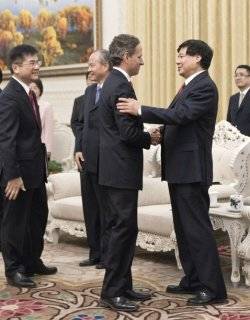The US treasury secretary, Timothy Geithner, is visiting Beijing this week, hoping to gain China’s support for US sanctions on Iran's oil industry.
China buys almost one-third of Iran's oil exports and has rejected the US sanctions as a tool to rein in Iran's nuclear programme.
Criticizing the new set of sanctions approved by President Barack Obama on New Year's Eve, China has called it improper and ineffective.
China's oil imports “have nothing to do with the nuclear issue", a deputy foreign minister, Cui Tiankai, said on Monday.
“We should not mix issues with different natures, and China's legitimate concerns and demands should be respected."
Geithner met his Chinese counterpart, Wang Qishan, the vice-premier, on Tuesday night and told him that the two sides “share so many important interests and among those are increasing our co-operation on global economic issues'.'
He is expected to meet on Wednesday Wen Jiabao, the Chinese premier; Xi Jinping, the vice-president who is in line to become China's next leader; and Li Keqiang, vice-premier and another rising star.
Trade disputes
US officials say the talks will also touch on trade disputes and complaints about China's currency controls that critics say keep its yuan undervalued and give its exporters an unfair advantage, distorting trade at a time when the US and other governments are under pressure to bring down unemployment.
China's trade surplus with the US widened 24.2 per cent to $17.4bn in December, according to data released on Tuesday.
China supported UN sanctions on Iran's nuclear programme but says action should be multilateral.
The US sanctions would target Iran's oil industry by barring financial institutions from the US market if they do business with Iran's central bank.
Industry analysts say that even if China agreed, it would face formidable challenges in trying to replace Iran as an oil source.
China's fast-growing economy is the world's biggest energy consumer and imports half its oil. About 11 per cent comes from Iran, or about 600,000 barrels per day in November, according to Argus Media, the energy-market analysts.
Geithner was also due to visit Tokyo, another major buyer of Iranian oil, for talks after leaving Beijing.
Against this backdrop of rising tensions in the Gulf, a US coast guard vessel rescued another six Iranian mariners in the waters off Iraq, according to a Pentagon announcement on Tuesday.
John Kirby, a spokesman for the Pentagon, said that a US coast guard cutter led the rescue mission, responding to a distress call about 80km southeast of the Iraqi port city of Umm Qaser.
The Iranians had signaled to the US boat using flares and flashlights, indicating that their vessel was taking on water and no longer seaworthy.
The rescue is the second such operation in less than week. On Thursday, US forces rescued 13 Iranian sailors being held hostage by Somali pirates.
PHOTO CAPTION
BEIJING, CHINA - JANUARY 11: U.S. Treasury Secretary Timothy Geithner (C) is greeted by an unidentified Chinese officer as U.S. Ambassador to China Gary Locke (L) looks on during a meeting with Chinese Vice President Xi Jinping (not in picture) at the Great Hall of the People January 11, 2012 in Beijing, China.
Aljazeera


 Home
Home Discover Islam
Discover Islam Quran Recitations
Quran Recitations Lectures
Lectures
 Fatwa
Fatwa Articles
Articles Fiqh
Fiqh E-Books
E-Books Boys & Girls
Boys & Girls  Articles
Articles










